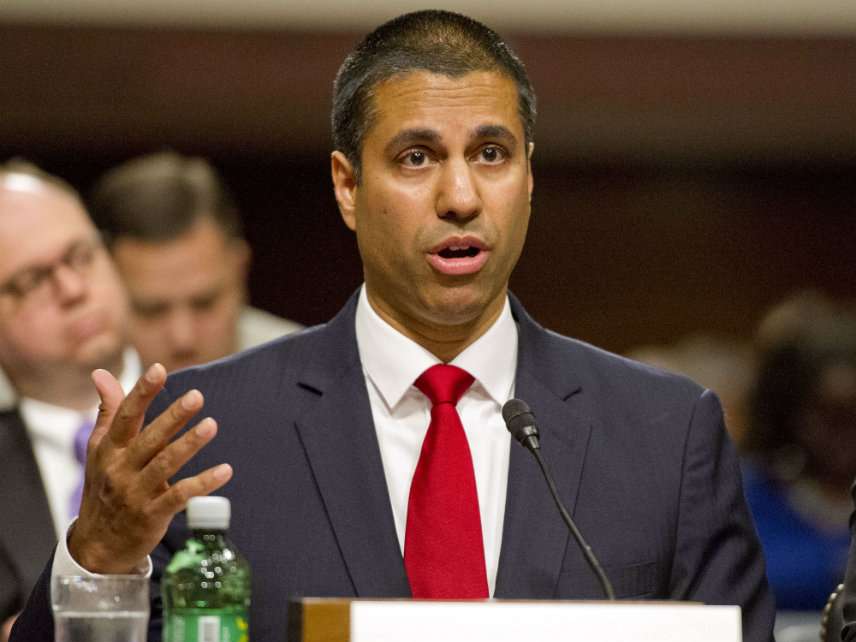The FCC Just Voted to Roll Back Obama-Era Net Neutrality Rules
New rules would require internet providers to be transparent about their services.

The Federal Communications Commission (FCC) voted on a party line vote today to rescind the net neutrality rules passed by the agency under President Obama. Two Republican-appointed commissioners joined agency Chairman Ajit Pai in a 3-2 vote to rescind the order and return to a standard that closely resembles the way the internet has been regulated for most of its existence. The vote was briefly delayed after security cleared the hearing room in the middle of Pai's remarks in order to conduct a search.
The Obama era rules reclassified internet service from a Title I information service to a more heavily regulated Title II telecommunications service, essentially treating it as an early 20th century utility, like the phone system. (As part of the reclassification process, however, the FCC declined to exert some of its regulatory authority.)
The rules generally required internet service providers to treat most pieces of information that flowed over the internet equally, effectively setting up a non-discrimination standard for network management, content, and pricing. Those requirements will no longer be in force.
Instead, the FCC will require ISPs to be transparent about their services, meaning that bandwidth throttling or other network management practices, which have sometimes been opaque to consumers, would have to be clearly labeled. The Federal Trade Commission (FTC), meanwhile, would be empowered to regulate anti-competitive or anti-consumer behavior, stepping in when internet companies make promises to provide a service that they do not keep.
Pai has framed the move as a return to the sort of "light-touch" regulation that has governed the internet since the Clinton era. "Under my proposal, the federal government will stop micromanaging the Internet," Pai said in November when details of his plan were released.
In a statement today, FCC Commissioner Brendan Carr, a Trump appointee who voted in favor of undoing the Obama era rules, noted that the internet would still be subject to federal oversight, noting that prior to the Title II reclassification, the FTC brought numerous privacy actions against ISPs and that federal antitrust law would still apply to internet service. "We are not giving ISPs free reign to dictate your online experience," he said. "Our decision today includes powerful legal checks."
The Obama-era regulations came with numerous exceptions and exemptions, and called for the FCC to make many decisions about how ISPs could manage network traffic on a case-by-case basis rather than on clear rules. Supporters argued that the goal was to avoid undesirable rule-driven outcomes, but the effect was to empower federal regulators to decide which internet management innovations would be allowed and which would not.
The regulatory rollback has been the subject of intense criticism from Democrats and activists, and even a small number of Republican lawmakers: In recent days, both Sen. Susan Collins (R-Maine) and Rep. Mike Coffman (R-Colorado) requested that the FCC delay the vote. Sen. John Thune (R-South Dakota) called on Congress to pass net neutrality legislation, but the idea has so far gained little traction amongst Republicans.
The FCC began its net neutrality push during the Bush administration with a series of policy guidelines supporting the principle of nondiscrimination. But the effort to install stronger rules became a priority under President Obama, who campaigned on setting up internet nondiscrimination regulations. The rules took multiple forms, and were consistently challenged in court. It is possible, and perhaps even likely, that today's move will end up the subject of legal challenges as well.
The Obama-era rules focused the FCC's regulatory authority on ISPs over other types of internet companies. Although the net neutrality debate is often framed as one that pits consumers versus large internet providers, it can also be understood as a regulatory tug-of-war between two types of companies on the web. Many of the largest internet content companies — so called "edge providers" like Google, Facebook, and Netflix have supported net neutrality in recent years. Recently, however, Netflix, has backed away from its previous support for net neutrality, having made a number of private connection deals that make net neutrality less useful to its business model. "Where net neutrality is really important is the Netflix of 10 years ago," CEO Reed Hastings said in May. "It's not our primary battle at this point."
The shift in strategy is telling: Netflix favored net neutrality rules as a way to preserve a business advantage. As it has grown, it no longer needs that advantage. The debate over net neutrality was always, in part, a tug-of-war over regulatory advantage between tech industry giants. Today, the FCC took steps to stay out of the fight — and remain a neutral regulator over the net.


Show Comments (366)